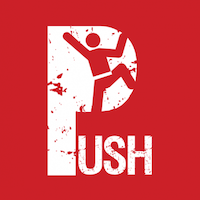COMPETITION RULES – ROCKTOBER 2024
Climbers Code of Conduct
We expect that all competitors will treat other climbers, judges, belayers, and volunteers with respect, and represent themselves well.
Failure to do so may result in disqualification from the event.
The use of drugs, tobacco, and alcohol while competing at Push’s Rocktober Fest is strictly prohibited.
Competition Rules
Athletes can choose the category they want to compete in, but they can not choose to be placed in Beginner, Intermediate, or Open divisions.
Category division placement will be finalized after the qualifying round.
During the qualification round, participants will face 30 to 50 routes.
Each category will have its own final round, held on the same day as the qualification round. The top four finalists from each category will advance to the finals. In the final round, Bouldering will feature three routes, while Top Rope and Lead will each have one route. Categories separated for women and men groups.
All winners of Vietnamese Nationality will be invited to the HCMC Indoor Climbing Championship 2024, free of charge.
If climbers fall, their attempt ends and is lowered. The climber must start at the back of the line for their next attempt.
A climber’s attempt shall be deemed to have started when both feet have left the ground.
The climber must CONTROL the finish hold on a roped route but is not required to match hands to receive points for the completion of that route.
The climber must establish contact with the route judge so that the judge may verify control of the finish hold.
The weighting of the rope will be considered a fall.
The Coordinator may choose to allow competitors with their scorecards in a queue, to also make one last attempt (time permitting). Otherwise, climbers MUST turn in their scorecards.
Scoring
This is a flash/redpoint format competition – points are awarded if the climber completes each route or boulder problem without falling.
Climbers are allowed as many attempts on each problem as they can do, however, each attempt is worth -10 points.
The number of points awarded is based on the number of attempts used to complete the route.
Deducting All of the competitor’s top rope completed climbs will be used to calculate the climber’s final score and final category placement.
The higher the points, the harder the route.
Ties will be decided in favor of the climber who used fewer attempts, i.e. falls will break ties.
If ties remain, climbers will climb a route of the next highest category.
The climber with control of the most holds wins.
Disqualification
The following behavior may result in the immediate disqualification of the athletes from the competition.
The use of non-approved equipment.
Z Clipping & Skipping Quickdraw.
The use of any knot other than Figure 8 follows through with an overhand knot. The use of any knot other than the figure-eight knot will require an additional backup knot afterwards.
Untying from the rope while climbing.
Distracting or interfering with any competitor, who is preparing for, or attempting a route.
Distracting or interfering with any official while they are carrying out their duties.
Failure to comply with the instructions of the official judges and/or the organizer’s officials.
The use of prohibited drugs, and/or use of alcohol at any point during the event, including but not limited to, registration and check-in is considered unsporting behavior.
Bolt hangers and quickdraws are not permitted to be used as hand holds or foot holds at any time.
Neither the side edges nor the top edge of the wall shall be used for climbing unless specifically designated as part of the route/problem. Only designated holds and features are permitted for climbing each route. Rules and instructions regarding a route may be given by the Route Judge prior to a competitor’s attempt if asked for.
The Route Judge may order an attempt to end if he or she decides that proceeding further would contravene the regulations regarding the safety of the competitor.
The refusal by a competitor to obey the instruction of a Route Judge to terminate their attempt on a route shall result in the disqualification of the competitor.
Technical Incidents
A technical incident is: A broken or spinning hold / Tape stuck to a shoe / An open wound / Anything else that creates an unfair disadvantage to a competitor that is not the result of an action on the part of the competitor.
If a technical incident occurs, the climber may reclimb the route from the beginning without penalty.
It is the climber’s responsibility to ensure that his/her clothing, chalk bag, and other equipment are properly secured. There are no grounds for a technical if the above-mentioned items impede the climber.
Spinning holds or other technical incidents must be declared by the climber AT THE TIME OF ITS OCCURRENCE.
If the competitor feels he/she is the subject of an unfair disadvantage while climbing, he/she must declare so WHILE ON THE ROUTE. If the route judge agrees that the incident has created an unfair disadvantage, the competitor will be lowered to the ground and will be allowed another attempt on the route, with no penalty incurred. If the route judge does not agree that a technical incident has occurred, the competitor must continue his/her current attempt on the route. If a competitor does not agree with the score, he or she must appeal to the Chief Judge.
